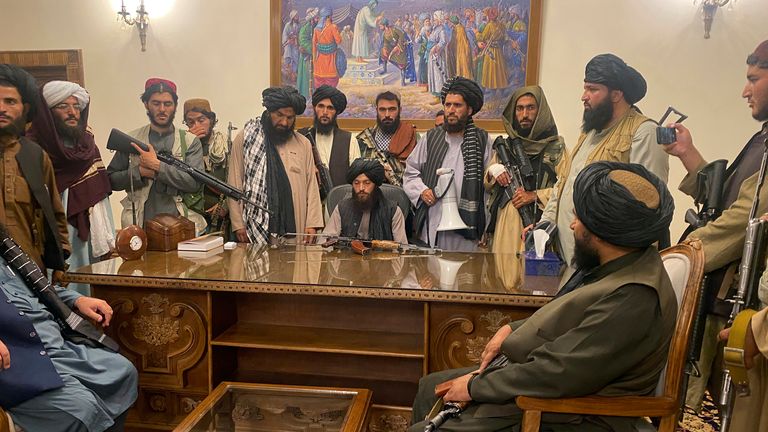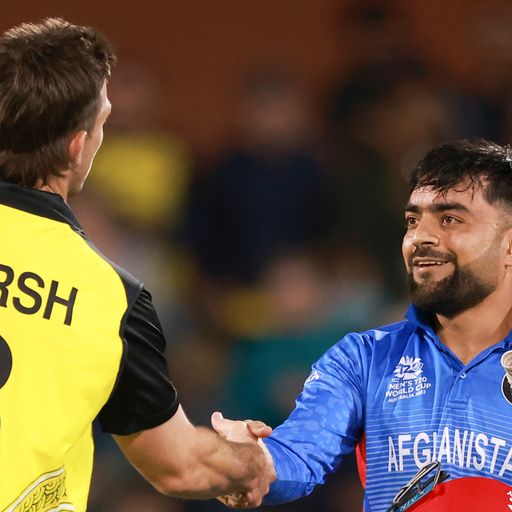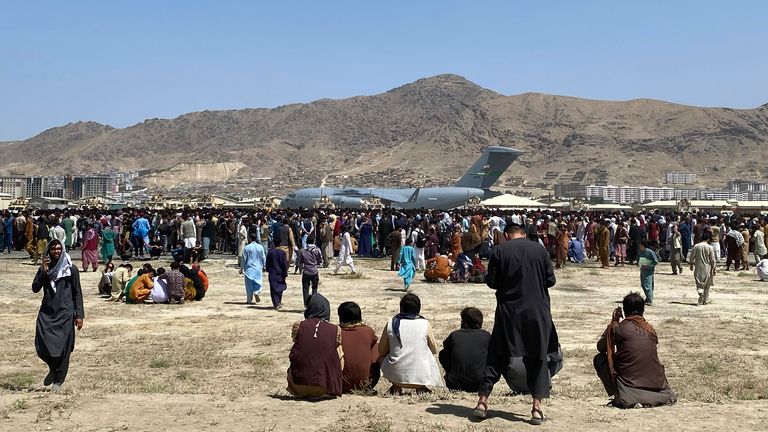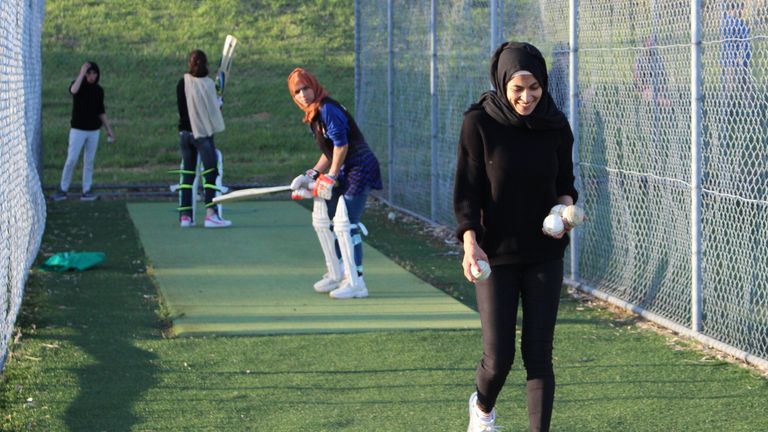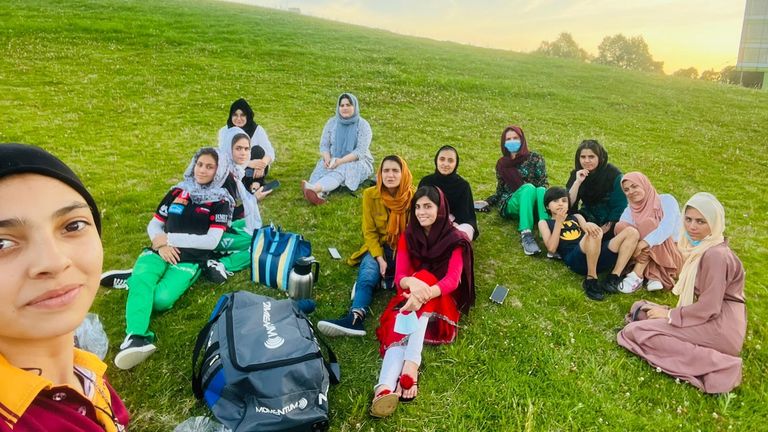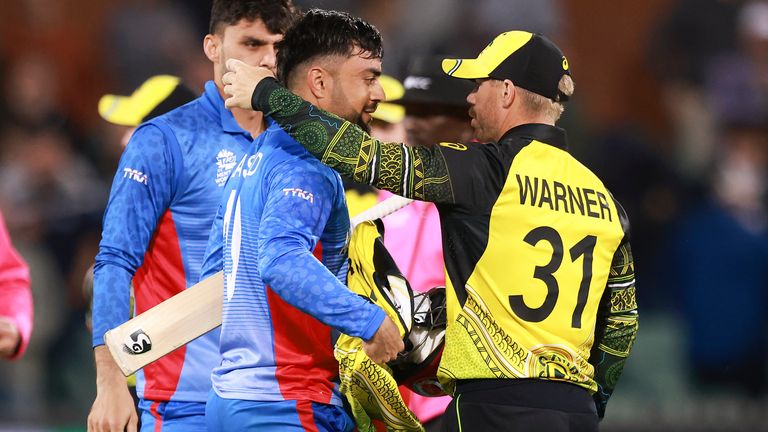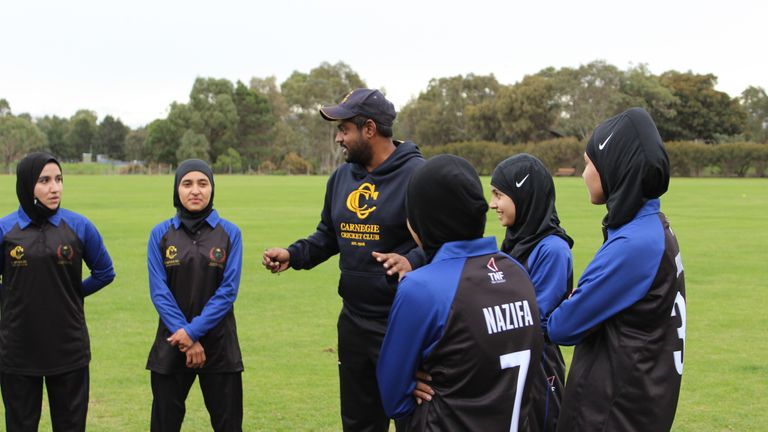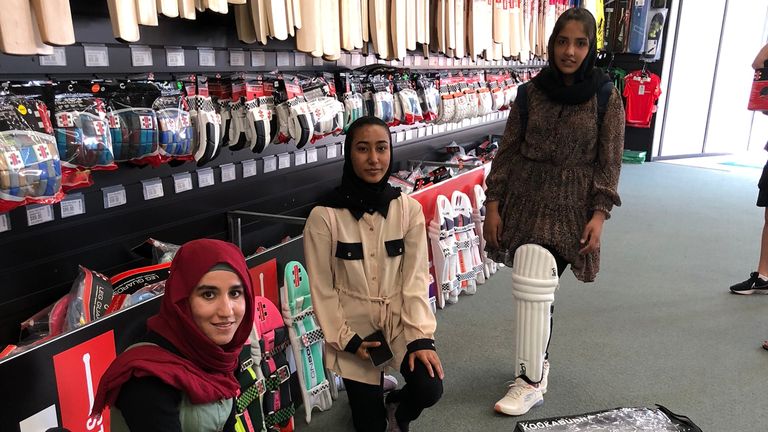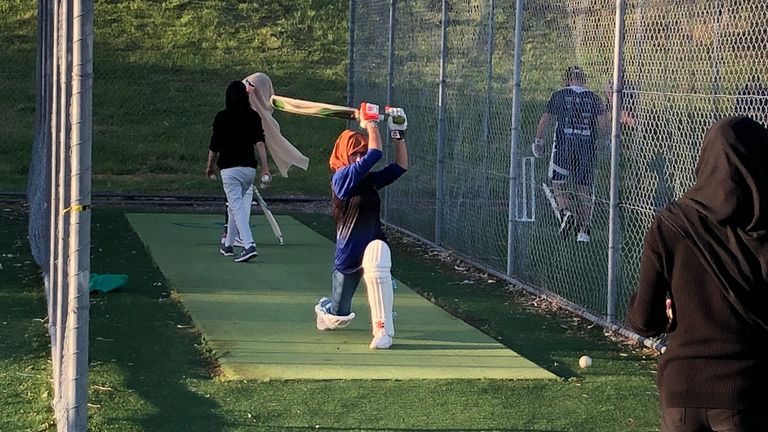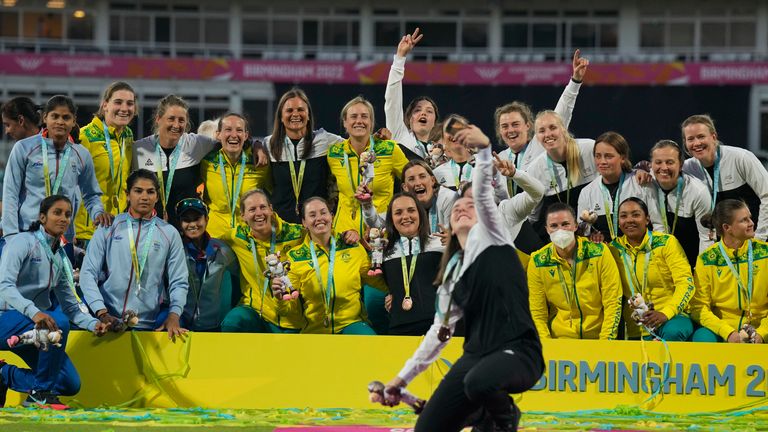Afghanistan Women's cricket team on being let down by international community - 'We are forgotten'
Sky Sports News' Amar Mehta has spoken to several members of the Afghanistan Women's squad who have highlighted the lack of support they've received from the international cricket community, but could the Olympics prove an unlikely pressure point for cricket's stance on Afghanistan?
Thursday 23 February 2023 19:38, UK
Afghanistan's women cricketers feel abandoned and forgotten after the Taliban regained power, but now, finally, will the sport listen to their plea for help?
"So many girls in Afghanistan are talented and love to play cricket. It's really hard when you don't have support, especially from the ICC. It's important they support us but unfortunately, we haven't had it. The men had so much support from the whole world and when you don't, it makes it hard. We are forgotten in Afghanistan." - anonymous cricketer, Afghanistan Women's Team.
The return of the Taliban to Afghanistan in 2021 resulted in oppression for women throughout the nation, with every member of their national cricket team forced to flee, fearing for their safety.
Sky Sports News' Amar Mehta has spoken to several members of the squad who've highlighted the lack of support they've received from the international cricket community, but could the Olympics prove an unlikely pressure point for cricket's stance on Afghanistan?
Cricket has been a beacon of hope in Afghanistan for much of the 21st century.
Trending
- Usyk denies Fury in intense world championship rematch
- Big fight reaction: What next for Fury and Usyk after contentious call?
- Highlights: Usyk overcomes Fury in epic heavyweight rematch
- Fury rages: I was robbed... Usyk got a Christmas gift!
- 'He got a Christmas gift!' | Fury left fuming in post-fight press conference
- Papers: Arsenal, Man City and Bayern in three-way battle for Olmo
- 'Uncle Frank is blind!' | Usyk responds to Fury complaints
- Littler tested on emotional Worlds return: 'Never felt anything like that'
- 'I want my revenge!' Dubois storms ring to demand Usyk rematch
- PL hits & misses: Arsenal are title-race ready, Man City are ordinary
When a ban on the sport was lifted by the Taliban in 2000, it developed significantly. Its proximity to India and Pakistan helped the game grow in popularity, particularly among refugees in Peshawar.
Fast forward to June 2017 and the Afghanistan Cricket Board (ACB) persuaded the International Cricket Council (ICC) to award it full member status, entitling the national men's team to participate in official Test matches.
Despite failing to meet the criteria around women's cricket, they were awarded their membership with the view progress would be made in that area. In 2020, 25 women were awarded central contracts and were showcased in advertising campaigns by the national cricket board.
However, the dreams of the nation's female cricketers were shattered in August 2021 when western states left Afghanistan and the Taliban filled the vacuum of power left behind.
Despite promises made that women would be allowed more freedom under the new regime, women's rights have slowly eroded, and they have been banned from public spaces, education, work and sport.
Fearing for their lives, many Afghans fled the country when it became clear the Taliban would form a government. According to Human Rights Watch, in the days, weeks and months following the Taliban's takeover, female athletes, including cricketers, were forced to hide medals and equipment. Their payments were stopped, and the homes of suspected athletes or male supporters were raided.
Many of the women cricketers fled over the border into Pakistan and 22 of the 25 centrally contracted players were granted emergency visas by the Australian government.
Batter Firoza Amiri is one of those who has resettled in Australia. She started playing cricket as a teenager and was given a professional contract for Herat when aged 17.
"It was our dream to play cricket. We went to school to play cricket and not study. After the Taliban took over, everything changed," she told Sky Sports News.
Batter Nazifa Amiri, who has also resettled in Australia, added: "We hoped to build our teams and play for our country. We have given up our dreams. We knew it was all over [when the Taliban took over]."
'We are forgotten in Afghanistan'
Memories of the difficult period in 2021 still reverberate with those women who have resettled in Australia, but they have tried to stay positive with the support offered by those who helped them escape the Taliban.
They were given hope of a future in Australia and were allowed to play cricket - albeit without the colours of their national team.
But in the 18 months since their ordeal, they told Sky Sports News that nobody from the ICC or ACB has contacted them, and they feel unsupported by the cricket community.
All-rounder Firoza Afghan described it as a "very sad" situation.
"No one supported us, apart from Australia. Neither our cricket board nor the ICC knew we were in Australia until we told them," she told Sky Sports News.
"We are a team that no one knows about. We left a very bad situation in Afghanistan, but the ICC never supported us. We are one part of the Afghanistan Cricket Board, and they don't know where we are. Without the Australian cricket team, we wouldn't have the support."
Another player, whose name has been withheld for safety reasons, added that it is regretful not to have the support of the ICC.
"So many girls in Afghanistan are talented and love to play cricket. It's really hard when you don't have support, especially the ICC," she said.
"It's important they support us but unfortunately, we haven't had it. The men had so much support from the whole world and when you don't, it makes it hard. We are forgotten in Afghanistan."
All the women want is a chance to play cricket and prove that they can compete with the best players at tournaments like the Asia Cup and World Cups.
Firoza Amiri said: "Cricket is important for Afghanistan. We don't want the men's team banned. We want them to stand with us. We love the men's team and we came to cricket through them.
"Cricket is one of the most important subjects [in Afghanistan] and the people love it. I started dreaming to play cricket while watching the men's team."
"We want the ICC to give us a chance. It doesn't matter where, we just want to put our uniform on and represent Afghanistan," Afghan added.
"Give us that chance for all the girls in Afghanistan. We want the chance for the next generation and girls who have dreams to play cricket and study."
'We can show the world the power of women'
Cricket's inaction on the issue appeared to change earlier this year when Australia's men's team decided to withdraw from an ODI series against Afghanistan in the United Arab Emirates, citing a protest against the introduction of a ban on women at university by the Taliban.
The decision divided cricket, with some supportive of the strong stance but others believing it sets Afghan cricket back.
Several of the men's team, including Rashid Khan, said politics and sport should not mix, threatening to pull out of the Big Bash League in Australia.
Firoza and Nazifa Amiri said they were happy about Australia's decision but were disheartened by the lack of support from the men's team.
Firoza Amiri said: "Afghanistan's men can play in Dubai but we can't play. I was happy about the decision and thought it would make a difference.
"Our cricketers all came to the media and said politics shouldn't get involved in cricket but why didn't they support us?"
Afghanistan's female cricketers have urged governing bodies to continue to allow Afghanistan to play cricket but want the men to be more vocal in their support.
Nazifa Amiri added: "We are upset when they didn't support us. The ACB are using the photos of the women's team, but the ICC don't want to ask them where the girls are.
"If they [the men's team] stand with us, we can show the world the power of women. I don't know why they don't want to speak. They live in another country; some are in Australia. They are not in danger."
Sky Sports News contacted the ACB and several of the men's team for comment but received no response. One member of the coaching set-up told Sky Sports News that no official or player is "allowed to talk about women's cricket".
'They don't want gesture politics, they want to play cricket'
Dr Geoff Dickson, a director at the Centre for Sport and Social Impact at La Trobe University in Australia, questioned the Australian players' motives for pulling out of the tour, while insisting it was unlikely to have any impact on the Taliban.
"Australia's withdrawal is essentially detrimental to the interests of Afghan cricket," he said. "The players play a lot of cricket and it's an extraordinary amount of time on the road.
"These days the players are well remunerated. It's a no-brainer not to go. I can't imagine many of the Australian players would have had their heart set on this tour."
He added: "Ninety-nine per cent of the Australian population had no idea the Afghanistan tour was going to happen.
"Sport organisations have got limited capacity to bring about societal change. It's not within their scope to bring about regime change. Is Cricket Australia's boycott going to change anything, other than arguably constrain cricket? It's water off a duck's back to the Taliban?"
Dr Afzal Ashraf, a professor in International Relations at Loughborough University, agreed the withdrawal won't have any impact and described Australia's stance as "gesture politics".
He said: "This will only embolden the hardliners. Sport is one of the best ways of engaging directly with the population. Withdrawing support cuts off that avenue.
"What Australia are doing is punishing the young people, who didn't choose the Taliban as their government. They don't want this gesture politics. They want to play cricket.
"One of the positive things sports can do is work with all their nations involved and find ways that Afghans can play this game. They can't play at home, but they can play abroad."
On announcing the cancellation of the tour, Cricket Australia had said: "CA is committed to supporting growing the game for women and men around the world, including in Afghanistan, and will continue to engage with the Afghanistan Cricket Board in anticipation of improved conditions for women and girls in the country."
'What is happening in Afghanistan is gender apartheid'
The ICC is set to meet in March, where the future of Afghanistan's women cricketers will be on the agenda.
So far, cricket's governing body has been unwilling to sanction Afghanistan, and the ICC declined to comment when approached by Sky Sports News.
A source at cricket's governing body had previously said they believe it is better to be "in the country and influence. If we walk away, that's any chance of influence gone", adding that the ICC doesn't support players directly, leaving that to members.
In November 2021, shortly after the Taliban took power, the ICC Board appointed a working group - led by Imran Khwaja, Ross McCollum, Lawson Naidoo and Ramiz Raja - to review the situation in Afghanistan.
Last November, the group met with a representative of the Afghanistan government and ACB in Doha and were told that the Taliban remains committed to "fully respect and comply with the ICC constitution, in particular the need for diversity and inclusion".
Human Rights Watch (HRW), though, has called for the ICC to take stronger action against Afghanistan.
Minky Worden, the director of global initiatives at HRW, told Sky Sports News: "The ICC and national federations like the ECB are actually facing a real test of their values. Cricket Australia has done the principled thing."
She added: "What is happening in Afghanistan is a form of gender apartheid. It not only fails to uphold and support the rights of female athletes to play sport, but actually actively bans them.
"Athletes are living in fear of being beaten or jailed for simply participating in sport… I think the ICC should be referred to the Olympic charter that says sport is a human right."
Cricket's Olympic ambitions at stake
With the ICC refusing to make demands on Afghanistan, could the International Olympic Committee (IOC) influence the situation as cricket bids to become accepted into the Olympic Games?
A key policy for the IOC is gender parity and at the 2020 Tokyo Olympics, all 206 nations, including Afghanistan, fielded women athletes.
"Under the Olympic Charter, gender discrimination is banned. The ICC and cricket is trying to be part of the Olympic family," Worden said.
"The IOC is coming under enormous pressure from Human Rights Watch to ban the Taliban from the Olympic movement and in parallel, the ICC is trying to join the Olympic movement at the exact time the IOC has put out clear benchmarks for the Taliban.
"You cannot exclude half the population. The ICC should be communicating that the Taliban has made a decision that is in violation with its anti-discrimination policy."
The IOC has not yet taken a decision on Afghanistan's involvement at Paris 2024, but it has twice sent a delegation to Qatar to meet representatives of the Taliban seeking commitment for the inclusion of women.
"Cricket could be one of the meaningful pressure points on Taliban-controlled government," Worden added.
"It is a point-blank violation of the Olympic Charter. There isn't any middle ground."
Should the IOC ban Afghanistan, then the ICC may not want to risk its own Olympic dreams and could be forced to take the action that Afghanistan's female cricketers have called for.
One thing is clear - the sport should listen to the forgotten voices of girls and women who have dreams of playing cricket again in Afghanistan.


